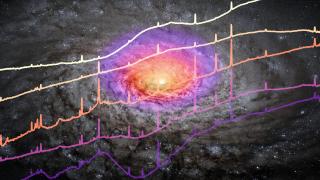Bibcode
López, R.; Acosta-Pulido, J. A.; Estalella, R.; Gómez, G.; García-Lorenzo, B.
Bibliographical reference
Monthly Notices of the Royal Astronomical Society, Volume 447, Issue 3, p.2588-2602
Advertised on:
3
2015
Citations
2
Refereed citations
2
Description
In this work, we derive the full 3D kinematics of the near-infrared
outflow HH 223, located in the dark cloud Lynds 723 (L723), where a
well-defined quadrupolar CO outflow is found. HH 223 appears projected
on to the two lobes of the east-west CO outflow. The radio continuum
source VLA 2, towards the centre of the CO outflow, harbours a multiple
system of low-mass young stellar objects. One of the components has been
proposed to be the exciting source of the east-west CO outflow. From the
analysis of the kinematics, we get further evidence on the relationship
between the near-infrared and CO outflows and on the location of their
exciting source. The proper motions were derived using multi-epoch,
narrow-band H2 (2.122 μm line) images. Radial velocities
were derived from the 2.122 μm line of the spectra. Because of the
extended (˜5 arcmin), S-shaped morphology of the target, the
spectra were obtained with the multi-object-spectroscopy (MOS) observing
mode using the instrument Long-Slit Intermediate Resolution Infrared
Spectrograph (LIRIS) at the 4.2 m William Herschel Telescope. To our
knowledge, this work is the first time that MOS observing mode has been
successfully used in the near-infrared range for an extended target.
Related projects

Nuclear Activity in Galaxies: a 3D Perspective from the Nucleus to the Outskirts
This project consists of two main research lines. First, the study of quasar-driven outflows in luminous and nearby obscured active galactic nuclei (AGN) and the impact that they have on their massive host galaxies (AGN feedback). To do so, we have been granted time with the Gran Telescopio CANARIAS (GTC) in the optical and near-infrared ranges
Cristina
Ramos Almeida

Nuclear Activity in Galaxies: a 3D Perspective from the Nucleus to the Outskirts
This project consists of two main research lines. First, the study of quasar-driven outflows in luminous and nearby obscured active galactic nuclei (AGN) and the impact that they have on their massive host galaxies (AGN feedback). To do so, we have been granted time with the Gran Telescopio CANARIAS (GTC) in the optical and near-infrared ranges
Cristina
Ramos Almeida